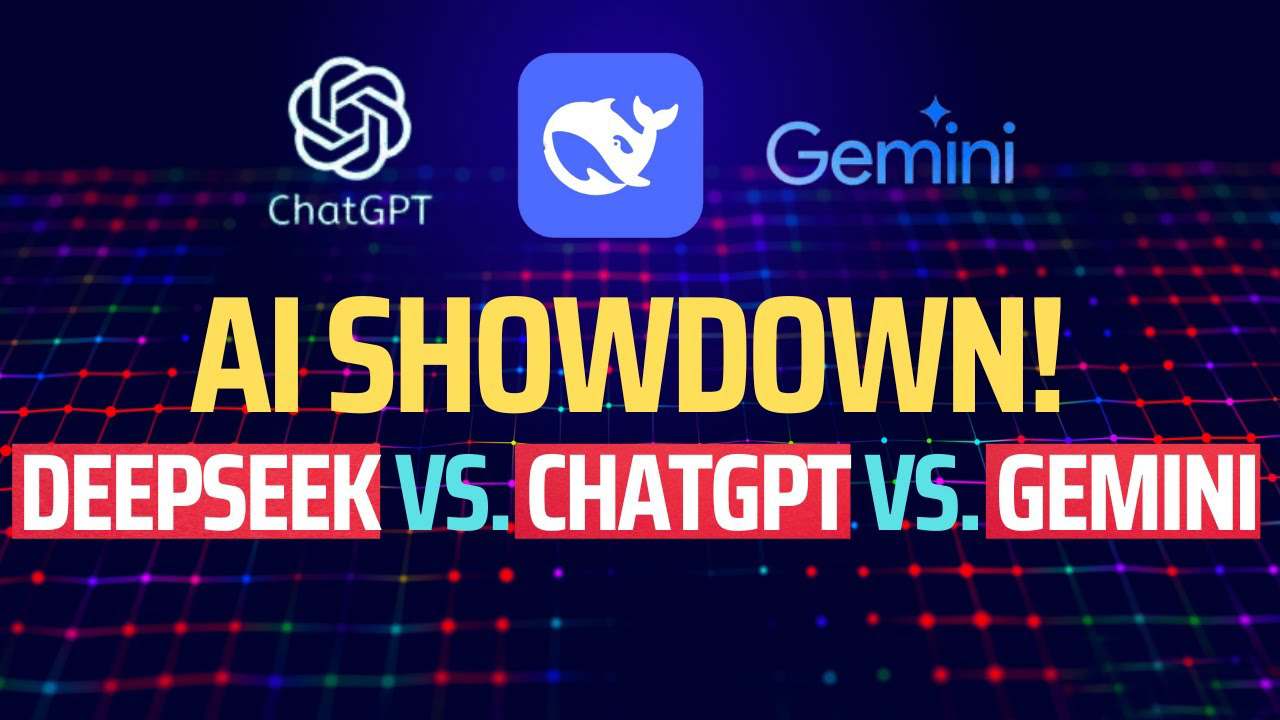
Introduction to AI Landscape
DeepSeek vs ChatGPT vs Google Gemini: The rapid advancement of artificial intelligence (AI) has significantly shaped the technology landscape as we navigate through the 21st century. Major players in the field include not just renowned entities like OpenAI and Google but also emerging competitors from countries such as China, which is striving to establish its foothold in AI development. This international competition is crucial as it not only accelerates innovation but also raises questions about ethical considerations, data privacy, and global economic balances.
AI applications have proliferated across various sectors, including healthcare, finance, logistics, and education, showcasing the technology’s potential to optimize processes, enhance decision-making, and provide critical insights. As these technologies advance, they create opportunities for both individual users and larger organizations to leverage AI functionalities for competitive advantages. However, such advancements are accompanied by challenges that require careful navigation, especially in terms of regulatory frameworks and societal impacts.
In this context, platforms such as DeepSeek vs ChatGPT vs Google Gemini emerge as key players that merit comparative examination. DeepSeek is China’s ambitious AI initiative, aiming to rival established Western AI technologies with its homegrown capabilities. On the other hand, ChatGPT, developed by OpenAI, has garnered attention for its impressive natural language processing abilities, widely utilized for content creation and conversational applications. Google Gemini represents the search engine giant’s foray into generative AI, capitalizing on its massive data reservoirs and machine learning expertise.
This blog post will delve deeper into these technologies—DeepSeek, ChatGPT, and Google Gemini—exploring their features, functionalities, and the implications of this international race for leadership in the AI domain. As the competition intensifies, understanding the strengths and weaknesses of these platforms is crucial for stakeholders across various industries.
What is DeepSeek?
DeepSeek is an emerging artificial intelligence platform developed in China, strategically positioned to compete against established AI counterparts such as ChatGPT and Google Gemini. This platform is characterized by its sophisticated architecture, which integrates advanced machine learning techniques and neural network models to enhance its cognitive capabilities. The technology underpinning DeepSeek encompasses innovations in natural language processing (NLP), machine learning, and data analysis, providing a robust foundation that aims to rival existing AI solutions.
The training data utilized by DeepSeek consists of a vast and diverse dataset curated from publicly available sources, proprietary content, and multilingual corpora, enabling the AI to understand and generate text across various contexts and languages. This diverse training regimen not only expands its operational scope but also enriches the model’s ability to engage with users from different cultural and linguistic backgrounds. Developed by a consortium of Chinese tech firms and academic institutions, DeepSeek is a testament to China’s commitment to advancing its position in the global AI landscape.
DeepSeek’s unique selling points include its adaptability to specific industries and its tailored approach towards various use cases. Applying AI ingenuity, the platform targets sectors such as e-commerce, finance, healthcare, and education, addressing industry-specific needs through customized AI solutions. For instance, in the e-commerce sector, DeepSeek facilitates enhanced customer engagement through personalized recommendations and efficient query handling. Similarly, its applications in healthcare involve predictive analytics and patient data management, showcasing the platform’s versatility.
In an era where the competition between AI models intensifies, DeepSeek emerges as a formidable player in the deepseek vs. chatgpt vs. google gemini landscape. Its innovative features, coupled with a focus on industry specific applications, are indicative of its potential to reshape how AI is integrated into various business frameworks and everyday life.
Understanding ChatGPT
ChatGPT, developed by OpenAI, is an advanced language model that leverages transformer architecture, a significant breakthrough in natural language processing (NLP). This architecture enables the model to understand and generate human-like text, making it an essential player in the AI landscape. The transformer mechanism allows ChatGPT to process input data in such a way that it can comprehend context better than previous models, leading to more coherent and contextually relevant responses.
One of the key capabilities of ChatGPT is its conversational abilities. The model has been trained on diverse datasets that encompass a wide range of topics. This extensive training allows it to engage in meaningful dialogues, answer complex queries, and provide insightful information across various disciplines. Its versatility makes it suitable for applications in customer service, content creation, programming assistance, and more, demonstrating its adaptability to different use cases.
Over the years, ChatGPT has undergone continuous updates and enhancements to improve its performance metrics. These updates involve refining algorithms, expanding the training datasets, and implementing user feedback mechanisms. As a result, the model has become even more adept at handling intricate prompts and generating responses that are not only accurate but also contextually appropriate. This iterative improvement is crucial in maintaining its competitive advantage in the evolving landscape of AI.
Moreover, ChatGPT plays a vital role in the AI ecosystem by fostering user engagement through interactive interfaces. It has been integrated into various platforms, enabling users to experience its capabilities firsthand. The feedback collected from these interactions helps inform future developments, making ChatGPT a dynamic entity that evolves in response to user needs and preferences. Overall, when comparing deepseek vs. chatgpt vs. google gemini,ai, the ingenuity and continual enhancements of ChatGPT position it as a formidable competitor in the field of conversational AI.
Introducing Google Gemini
Google Gemini represents a significant advancement in artificial intelligence, designed to reshape the landscape of AI-powered applications. As a cutting-edge AI model, Gemini is characterized by its sophisticated architecture and enhanced capabilities, enabling it to perform complex tasks with remarkable efficiency. The model is built on a foundation that prioritizes not only the understanding of language but also its application across diverse contexts, making it exceptionally versatile.
At the core of Gemini’s design philosophy is the integration of deep learning techniques that allow it to analyze data and generate insightful responses rapidly. By leveraging vast datasets, its algorithms can identify patterns and provide nuanced answers that cater to user needs. This sophistication distinguishes Gemini from traditional search models, effectively competing with other AI entities like DeepSeek and ChatGPT. The model’s capacity to process context and nuance leads to more human-like interactions, setting a new standard for AI engagement.
Google’s broader AI strategy perceives Gemini as a pivotal component, playing a crucial role in enhancing its suite of services—including search, Google Assistant, and various productivity tools. By embedding Gemini’s robust capabilities into these platforms, Google aims to improve user experience significantly. This strategic positioning not only reinforces Google’s commitment to AI innovation but also highlights its intention to maintain leadership in a competitive environment filled with challengers like DeepSeek and ChatGPT.
As industries and users increasingly rely on AI solutions, Gemini’s potential impact extends beyond simple functionality; it redefines how individuals and organizations can leverage artificial intelligence. Through its advanced technology and thoughtful integration, Gemini is paving the way for new applications and efficiencies in various sectors.
Comparative Analysis of Technology and Features
The emergence of DeepSeek, ChatGPT, and Google Gemini has marked a notable development in artificial intelligence. A comparative analysis of these technologies reveals their respective strengths and limitations in multiple facets. Performance, a key metric for evaluating AI systems, often relies on benchmarks alongside real-world testing scenarios. For instance, while ChatGPT has demonstrated impressive conversational abilities in various domains, DeepSeek has excelled in specialized tasks, showcasing its adaptability within specific sectors.
In terms of model complexity, ChatGPT is built on the transformer architecture, highlighting its extensive training on a wide array of internet texts. DeepSeek, in contrast, employs a model tailored for specific tasks, allowing for deeper specialization, but potentially sacrificing versatility. Google Gemini similarly focuses on leveraging large-scale data, ensuring a robust and flexible approach. Each platform’s architecture plays a significant role in its overall capabilities, influencing language understanding and context retention.
Language understanding is critical for user interaction, and in this arena, ChatGPT has been noted for its nuanced comprehension of human language. However, DeepSeek’s strength lies in its decisiveness when faced with technical or well-defined queries, offering precise answers that cater to professional needs. Google Gemini, equipped with powerful contextual algorithms, stands as a close competitor, managing to retain contextual elements efficiently in extended conversations.
Training techniques are also a factor that differentiates these platforms. While ChatGPT benefits from a wide-ranging corpus that nurtures a generalist approach, DeepSeek primarily focuses on refined datasets geared toward specific industries, yielding more accurate results in those fields. User experience, the final piece of this comparative puzzle, varies among the platforms, with each providing distinct interfaces and interaction styles. Understanding these differences can guide users in selecting the appropriate AI solution for their needs.
Market Position and Adoption Rates
The competitive landscape of artificial intelligence platforms is constantly evolving, with significant differences in market position and adoption rates among DeepSeek, ChatGPT, and Google Gemini. Each of these AI models has uniquely positioned itself within various sectors, reflecting differing user demographics and preferences. DeepSeek, emerging from China, has made substantial inroads in the domestic market, especially in education and healthcare. Its capability to process vast amounts of data while facilitating personalized learning experiences has led to its acceptance in schools and universities. Furthermore, its application in healthcare assists in patient diagnosis and medical research, contributing to improved patient outcomes.
Conversely, ChatGPT has witnessed considerable adoption in the business sector, largely due to its versatility in natural language processing tasks. Companies utilize ChatGPT for customer service automation, content generation, and creative writing, attributing increased efficiency and cost savings to its implementation. Its wide-ranging capabilities allow it to integrate seamlessly into various business models, making it particularly appealing to large enterprises focused on innovative operational strategies. The platform has also increasingly penetrated sectors like entertainment, where it aids in scriptwriting and interactive storytelling.
On the other hand, Google Gemini has carved out a niche by leveraging its extensive resources and partnerships, particularly within the tech and entertainment industries. Its ability to incorporate vast datasets from Google’s ecosystem significantly strengthens its performance across diverse applications. Gemini’s strategic collaborations with tech giants and academic institutions enhances its reach and credibility, attracting a broader user base in the global market. As these three AI models compete, the differing trends in adoption rates and their respective market positions reflect an ongoing shift in how artificial intelligence is embraced across various sectors.
Ethical Considerations in AI Development
As artificial intelligence continues to advance, ethical considerations surrounding AI technologies, including DeepSeek, ChatGPT, and Google Gemini, have become increasingly prominent. One of the foremost concerns is data privacy. These AI systems often require vast amounts of data to function effectively; however, the collection and use of such data can lead to privacy infringements if not handled responsibly. It is essential that organizations prioritize user consent and transparency regarding data usage, actively engaging users in understanding how their information contributes to AI performance.
Another critical issue is bias in AI models. Research has shown that AI systems can inadvertently perpetuate or even exacerbate existing societal biases if not carefully monitored. This bias often stems from the datasets used to train these models, which may not adequately represent diverse populations. In the comparison of DeepSeek, ChatGPT, and Google Gemini, it is necessary to evaluate the measures implemented by each system to mitigate bias and enhance fairness in their outputs. An ethical approach necessitates ongoing efforts to identify and rectify biases to develop AI technologies that are equitable and inclusive.
Transparency and accountability also play pivotal roles in ethical AI development. Users need to understand how decisions made by AI systems, such as those from DeepSeek or Google Gemini, are derived. Ensuring that AI decision-making processes are interpretable can help build trust among users, thereby fostering a more positive relationship with these technologies. Furthermore, regulatory frameworks are crucial in establishing guidelines for the ethical deployment of AI. Collaborative efforts from ethical AI organizations and regulatory bodies are essential to shape responsible practices that align with societal values.
Ultimately, fostering an ethical environment in AI development is vital for the successful implementation of technologies such as DeepSeek, ChatGPT, and Google Gemini. By prioritizing data privacy, addressing bias, ensuring transparency, and adhering to regulatory frameworks, developers can cultivate trust and maximize the positive impact of AI on society.
Future Outlook and Trends
The future of artificial intelligence presents a landscape rife with potential and challenges, particularly in the context of deepseek vs. chatgpt vs. google gemini. As technological advancements continue to accelerate, we can expect these AI platforms to evolve in several significant ways.
First and foremost, advancements in natural language processing (NLP) and machine learning algorithms are likely to enhance the capabilities of these systems. As organizations focus on refining their AI models, we may see marked improvements in how DeepSeek, ChatGPT, and Google Gemini understand and generate human-like text. This synergy between computational power and linguistic nuance could unlock new applications across industries, making these tools essential for businesses and individuals alike.
Moreover, the competition among these platforms will intensify, potentially leading to shifts in market leadership. Companies that harness deepseek vs. chatgpt vs. google gemini more effectively may dominate the AI landscape, influencing the direction of future technological innovations. We can anticipate a greater push towards integrating AI with other emerging technologies, such as robotics and the Internet of Things (IoT), which will further enhance productivity and efficiency.
Another notable trend is the growing emphasis on ethical considerations and regulatory compliance in AI development. As public awareness of AI’s implications rises, DeepSeek, ChatGPT, and Google Gemini will likely place greater importance on ensuring their systems adhere to ethical guidelines and safeguard user privacy. This focus will be critical in maintaining user trust and promoting long-term adoption.
As organizations and consumers navigate this evolving AI landscape, they can expect not only improved performance from these platforms but also innovative solutions tailored to meet diverse needs. The next few years promise to be pivotal in shaping the trajectory of AI technology, with all eyes on the competition among these influential players.
Conclusion: Key Takeaways
The exploration of DeepSeek, ChatGPT, and Google Gemini illuminates the competitive landscape of artificial intelligence technologies emerging from both China and the United States. As businesses, users, and stakeholders navigate this complex arena, it becomes increasingly vital to grasp the distinctions and commonalities among these platforms. Each AI system offers unique capabilities and features that cater to different user needs and applications, thereby influencing their adoption in various sectors.
DeepSeek has positioned itself as a formidable challenger to the established players, leveraging cutting-edge algorithms and data processing techniques that complement the advanced language understanding of ChatGPT. The latter, developed by OpenAI, has proven its versatility in conversational AI, enabling it to generate human-like text across diverse contexts. On the other hand, Google Gemini incorporates Google’s vast ecosystem, facilitating seamless integration of services while providing powerful analytical tools. Understanding these nuances is critical for organizations aiming to leverage AI for strategic growth and operational efficiency.














